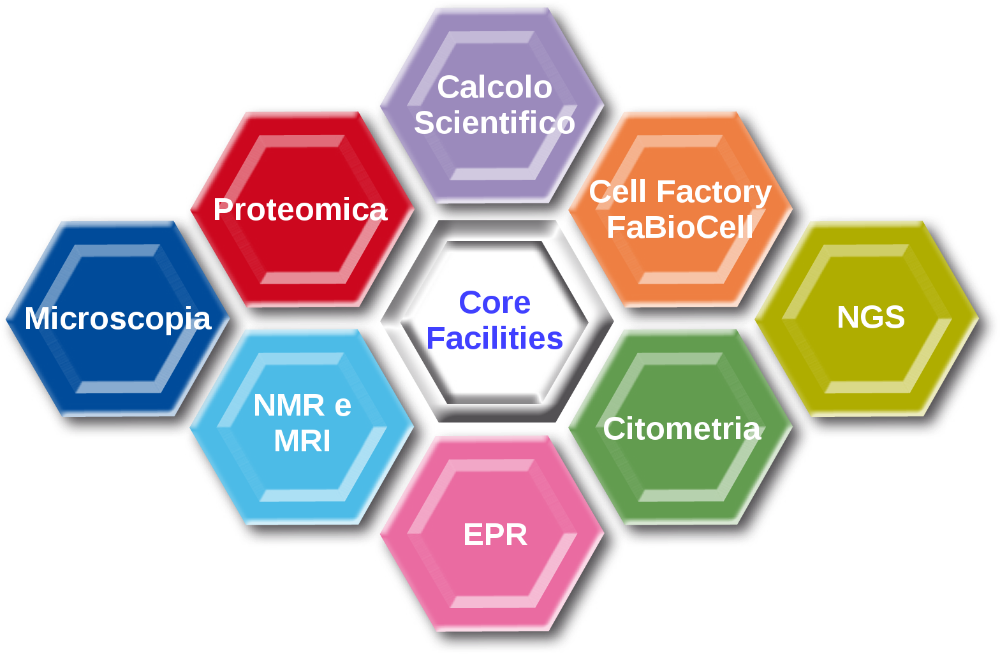Activity
The mission of the Technical Scientific Service Large Instrumentation and Core Facilities of the ISS is to carry out the following activities:
- support to the strategic management of the equipment assets of the Istituto Superiore di Sanità;
- design and development of instruments and new technologies;
- rationalization of the use of high-cost technologies with transversal possibilities of use within the Institute.
The Service also carries out, within the scope of its competence, research activities.
The structure promotes a continuous improvement of the professionalism and technological capabilities of the Istituto Superiore di Sanità, helping to maintain and increase its competitiveness in advanced biomedical research and the function of scientific reference for the country. The multidisciplinary skills present in the structure favour the performance of excellent research activities, sustainable in an autonomous or collaborative form, and the provision of technologically advanced services.
These services are presented to specialist external users through the following website: https://corefacilities.iss.it
Technical-scientific areas
The Service is informally divided into the following 8 areas:
Scientific computing
“High Performance Computing” (HPC): development and implementation of algorithms with a high degree of parallelism. Design, development and management of methods, tools and systems for the processing of data flows generated by scientific equipment in biomedicine and, in general, by archives and digital sources. Implementation on architectures: multicore, multi CPU, multi GPU. Machine learning, artificial intelligence, and Bayesian networks applications and libraries..
The area includes a Bioinformatics Service whose objective is to offer support in the analysis of high-throughput data from different sources: genomics (whole exon-sequencing), transcriptomics (RNA-seq, targeted-sequencing), epigenomics (ChIP-seq), proteomics.
[leggi di più...]
Reference person: dr. Irene Ruspantini
☎ +39 06 4990 3098
Cell Factory FaBioCell
FaBioCell is a cell factory, that is, a pharmaceutical workshop authorized to produce drugs for cell therapies that, together with gene therapy drugs and tissue engineering products, make up the family of Advanced Therapy Medicinal Products or ATMP. FaBioCell was born with the aim of favoring the process of transferring to the clinic the results of research conducted in the field of tumor immunotherapy, not only in the ISS but also in the context of collaborations with other research centres and clinical centres, taking into account the strong and growing attention to the promising prospects of clinical use of new personalized cellular drugs.
[leggi di più...]
Reference person: dr. Luciano Castiello
☎ +39 06 4990 6080
Cytometry
The Core Facility performs flow cytometric analyses, cytofluorimetric or mass, at the level of a single cell. The Area is equipped with three analyzers that allow analysis of up to 10 fluorescence parameters, two cell sorters able to separate up to four cell populations based on 10 fluorescence parameters and a mass cytometer (CyTOF) that allows multiparametric analysis between 25-35 parameters (up to a theoretical maximum of 90), based on the use of antibodies conjugated to rare metals. Cytofluorimetric analyses can be conducted in High-Throughput mode.
[leggi di più...]
Reference person: dr. Massimo Sanchez
☎ +39 06 4990 2576-2550
Electronic Paramagnetic Resonance (EPR)
The Electronic Paramagnetic Resonance (EPR) area is equipped with 4 X-band continuous wave spectrometers, one of which is very high sensitivity. EPR is applied, in vitro/ex vivo, to the study of free radicals, oxidative stress, antioxidants, protein structures, membranes, metalloproteins, radiation damage, including fields of pre-clinical research (degenerative diseases and tumors). The area also makes use of skills and techniques for the dosimetry of ionizing radiation (stimulated luminescence and other advanced detectors) and for the study of oxidative stress.
[leggi di più...]
Reference person: dr. Donatella Pietraforte
☎ +39 06 4990 2907
Microscopy
The area is equipped with:
- three laser scanning confocal microscopes for fluorescence studies of cellular systems, intact organisms and biological tissues
- an Olympus IX81 inverted microscope and a Zeiss LSM 900 system for live-imaging microscopy
- two high-resolution scanning electron microscopes
- a transmission electron microscope for ultrastructural analysis of biological systems
- the instruments necessary for the preparation of samples for both scanning and transmission electron microscopy
[leggi di più...]
Reference persons:
dr. Serena Cecchetti (Confocal Microscopy)
☎ +39 06 4990 2966
dr. Lucia Bertuccini (Electron Microscopy)
☎ +39 06 4990 2092
dr. Mario Falchi (Live-Imaging Microscopy)
☎ +39 06 4990 3667
Magnetic Resonance for MRI and High Resolution Spectroscopy
The area is equipped with:
- two spectrometers operating respectively at 9.4 T and 14.1 T in high resolution for metabolism and metabolomics studies in cells, biological fluids and tissues (NMR units in high resolution)
- an MRI system for in vivo imaging and spectroscopy for small animals operating at 7 T for morphological, molecular and functional imaging studies (MRI unit)
The area makes use of pre-clinical research expertise in oncology, neuroscience, aging and metabolic diseases.
[leggi di più...]
Reference person: dr. Rossella Canese
☎ +39 06 4990 2567-3695
Proteomics
The area consists of two units: mass spectrometry (MS) and reverse phase microarray (RPPA). Mass spectrometry is applicable to semi-purified proteins to identify and characterize post-translational and adducted modifications, as well as to the qualitative and quantitative study of complex mixtures, sub-cellular and total proteomes, biomarker research and analysis of protein complexes. The unit also relies on expertise in biological sample preparation and bioinformatics analysis of data. RPPA analysis studies signal transduction activity levels. Immunostaining, using more than 400 validated antibodies, enables automated semi-quantitative measurement of a large number of samples.
[leggi di più...]
Reference person: dr. Serena Camerini
☎ +39 06 4990 2294
Next Generation Sequencing (NGS)
The NGS service features a second-generation Ion GeneStudio S5 Next-Generation Sequencing system that leverages semiconductor chip sequencing technology (Ion S5 chip) to deliver accurate "multi-target" analysis at low cost and time compared to other sequencing systems.
[leggi di più...]
Reference person: Manuela Marra
☎ +39 06 4990 3051



